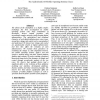Free Online Productivity Tools
i2Speak
i2Symbol
i2OCR
iTex2Img
iWeb2Print
iWeb2Shot
i2Type
iPdf2Split
iPdf2Merge
i2Bopomofo
i2Arabic
i2Style
i2Image
i2PDF
iLatex2Rtf
Sci2ools
HICSS
2012
IEEE
2012
IEEE
Change and Control Paradoxes in Mobile Infrastructure Innovation: The Android and iOS Mobile Operating Systems Cases
The advent of the smartphone as a highly complex technology has been accompanied by mobile operating systems (OS), large communities of developers, diverse content providers, and increasingly complex networks, jointly forming digital infrastructures. The multi-faceted and relational character of such digital infrastructures raises issues around how change and control can be conceptualized and understood. We discuss how change and control are paradoxically related in digital infrastructures and how they affect the evolution of such infrastructures. We examine these paradoxes by examining the change in, and competition between, two mobile operating systems: Apple’s iOS and Google’s Android along with their related platform features and ecologies. We seek to validate a proposed theoretical framework of the dynamics of change and control through second-order analysis of the two cases. We observe that multiple factors had a significant effect on the evolution of these platforms includi...
Biometrics | Digital Infrastructures | HICSS 2012 | Mobile Operating Systems | User Interface Development |
| Added | 21 Apr 2012 |
| Updated | 21 Apr 2012 |
| Type | Journal |
| Year | 2012 |
| Where | HICSS |
| Authors | David Tilson, Carsten Sørensen, Kalle Lyytinen |
Comments (0)

